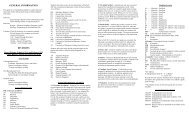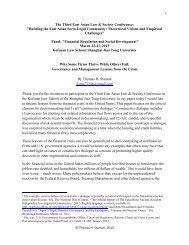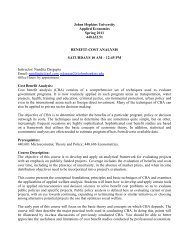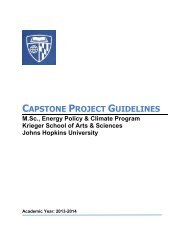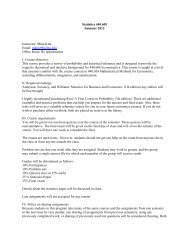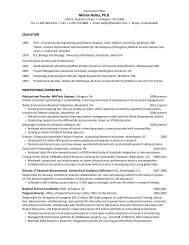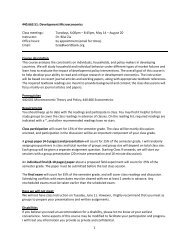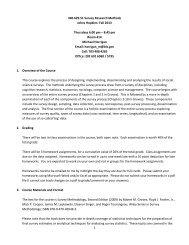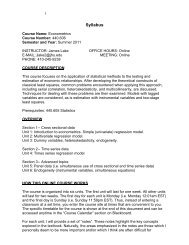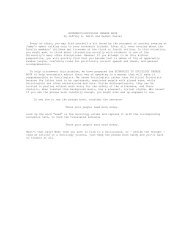Principles and Applications of Energy Technology - Advanced ...
Principles and Applications of Energy Technology - Advanced ...
Principles and Applications of Energy Technology - Advanced ...
You also want an ePaper? Increase the reach of your titles
YUMPU automatically turns print PDFs into web optimized ePapers that Google loves.
The role <strong>of</strong> risk <strong>and</strong> uncertainty will be highlighted throughout the course where appropriate. Broadly,there is tremendous uncertainty about how the future will unfold, including: if <strong>and</strong> when a policy will beimplemented, what the impact <strong>of</strong> a policy will be, whether or not some new technologies will becomefeasible at all, <strong>and</strong> if so when <strong>and</strong> at what cost (both in terms <strong>of</strong> required investment <strong>and</strong> environmentalimpact).It is should be evident from the significant breadth <strong>of</strong> this course that there will be a need to be selectivein the depth <strong>of</strong> coverage, <strong>and</strong> this will be the case; a more detailed treatment <strong>of</strong> some topics covered inthis course potentially lend themselves to entire courses e.g. transportation. Lectures <strong>and</strong> discussion willfocus on conveying the fundamental science <strong>and</strong> technology, economic, <strong>and</strong> environmental impact in aclear straightforward, but not simplistic manner. There is a significant benefit to providing the broaderenergy picture in this way because many <strong>of</strong> these topics <strong>and</strong> approaches are inherently interlinked. Insummary, the course will provide the core underlying principles <strong>and</strong> ideas, as well as provide numerouscitations <strong>and</strong> sources that will enable the student during the course, or later, to pursue areas <strong>of</strong> interest ingreater depth.Teaching Style: The course will be delivered primarily through lectures <strong>and</strong> discussion. One <strong>of</strong> theprimary goals <strong>of</strong> this course is for all students to gain a good grasp <strong>of</strong> underlying scientific, economic, <strong>and</strong>environmental principles associated with both individual technologies <strong>and</strong> portfolios <strong>of</strong> technologies. Themathematics used will be kept at a straightforward level.Instructor: Dr. Thomas Jenkin is a Senior <strong>Energy</strong> Analyst at the National Renewable <strong>Energy</strong>Laboratory (NREL) in Washington DC. He can be contacted by phone at (202) 488-2219 or by e-mail at Tjenki23@jhu.edu. He developed this course <strong>and</strong> first taught it in Spring 2010 (<strong>and</strong>subsequently in Fall 2010, Summer 2011 <strong>and</strong> Spring 2012). He has also developed <strong>and</strong> taught otherrelated energy courses at Johns Hopkins since 2008.Course Requirements: The main method <strong>of</strong> grading beyond some consideration <strong>of</strong> classparticipation will be through problem sets. Over the course there will be four problem sets h<strong>and</strong>edout that each need to be completed within two weeks. The problems sets will contain both conceptual<strong>and</strong> numeric problems, <strong>and</strong> students are encouraged to work together if that makes sense tounderst<strong>and</strong> ideas, though each student needs to h<strong>and</strong> in their own work. The problems sets will bedesigned consolidate underst<strong>and</strong>ing <strong>of</strong> the course material covered (rather than test innatemathematics ability).Grading: In determining grades for the course, class participation, exams <strong>and</strong> papers will beweighted as indicated below.(1) Class participation 20%(2) Problem Sets 80%Course Readings:There is no required text for the parts <strong>of</strong> the course that deal with economic, environmental impact<strong>and</strong> policy in depth, <strong>and</strong> indeed parts <strong>of</strong> the technology <strong>and</strong> science. These areas will be covered bythrough the lectures <strong>and</strong> through assigned papers <strong>and</strong> reports that will be available on the internet,electronically via JHU or h<strong>and</strong>ed out (see Syllabus <strong>and</strong> Readings for the preliminary list).(NREL), Resources for the Future (RFF), Federal <strong>Energy</strong> Regulatory Commission (FERC), World ResourcesInstitute (WRI), Intergovernmental Panel on Climate Change (IPCC), Lawrence Berkeley National Laboratory(LBNL), International <strong>Energy</strong> Agency (IEA), the Department <strong>of</strong> <strong>Energy</strong>’s (DOE) Office <strong>of</strong> <strong>Energy</strong> Efficiency<strong>and</strong> Renewable <strong>Energy</strong> (EERE), <strong>and</strong> the American Wind <strong>Energy</strong> Association (AWEA).DRAFT, August 23 rd 2012 (original version January 11, 2010, <strong>and</strong> previously updated August 24, 2010 <strong>and</strong>May 20 , 2011, <strong>and</strong> January 6, 2012). Based in part with modifications on course instructor developed forEnvironmental Challenges for <strong>Energy</strong> <strong>Technology</strong> <strong>and</strong> Policy (Original syllabus drafted September 1 st 2008,updated August 15 th 2009)





